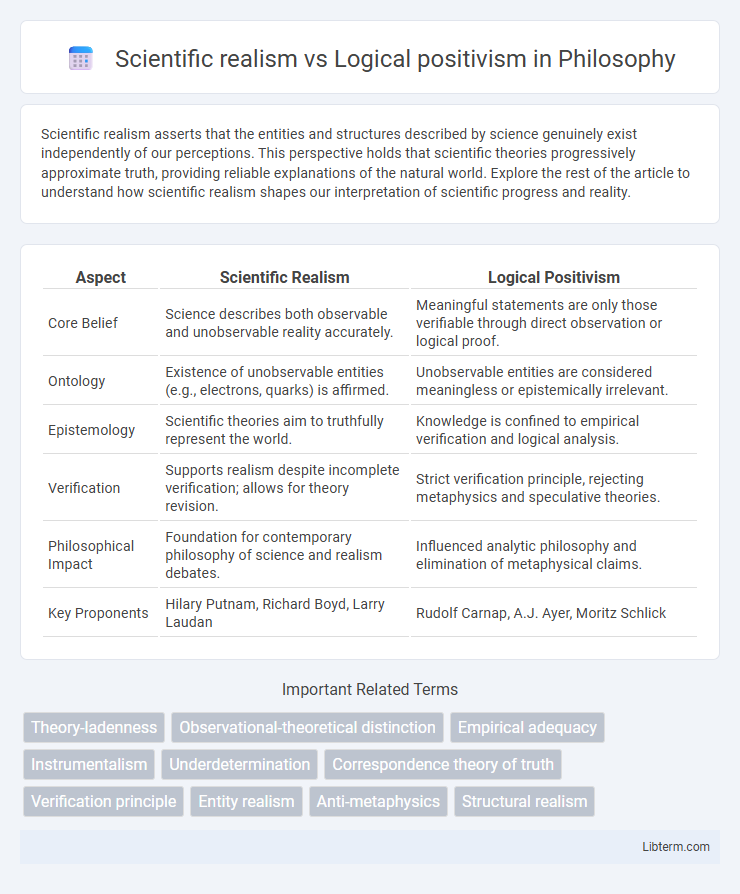Scientific realism asserts that the entities and structures described by science genuinely exist independently of our perceptions. This perspective holds that scientific theories progressively approximate truth, providing reliable explanations of the natural world. Explore the rest of the article to understand how scientific realism shapes our interpretation of scientific progress and reality.
Table of Comparison
| Aspect | Scientific Realism | Logical Positivism |
|---|---|---|
| Core Belief | Science describes both observable and unobservable reality accurately. | Meaningful statements are only those verifiable through direct observation or logical proof. |
| Ontology | Existence of unobservable entities (e.g., electrons, quarks) is affirmed. | Unobservable entities are considered meaningless or epistemically irrelevant. |
| Epistemology | Scientific theories aim to truthfully represent the world. | Knowledge is confined to empirical verification and logical analysis. |
| Verification | Supports realism despite incomplete verification; allows for theory revision. | Strict verification principle, rejecting metaphysics and speculative theories. |
| Philosophical Impact | Foundation for contemporary philosophy of science and realism debates. | Influenced analytic philosophy and elimination of metaphysical claims. |
| Key Proponents | Hilary Putnam, Richard Boyd, Larry Laudan | Rudolf Carnap, A.J. Ayer, Moritz Schlick |
Introduction to Scientific Realism and Logical Positivism
Scientific realism asserts that scientific theories aim to accurately describe both observable and unobservable aspects of the world, emphasizing the truth of scientific claims beyond mere empirical data. Logical positivism, rooted in the verification principle, holds that meaningful statements must be empirically verifiable or analytically true, dismissing metaphysical assertions as nonsensical. These foundational perspectives shape debates on the nature of scientific knowledge, theory confirmation, and the limits of scientific explanation.
Historical Background of Both Philosophies
Scientific realism emerged in the 17th century alongside the Scientific Revolution, emphasizing that scientific theories describe an objective reality independent of our observations. Logical positivism originated in the early 20th century with the Vienna Circle, promoting verificationism and rejecting metaphysics by asserting that meaningful statements are either empirically verifiable or tautological. Both philosophies reflect distinct historical responses to the development of science: scientific realism rooted in the trust of empirical observation and logical positivism grounded in the linguistic analysis and logical structure of scientific statements.
Key Philosophical Tenets of Scientific Realism
Scientific realism asserts that the universe described by science exists independently of human perception and that scientific theories aim to provide true descriptions of both observable and unobservable phenomena. It emphasizes the belief in the approximate truth of well-established scientific theories and the existence of theoretical entities such as electrons and black holes. In contrast, logical positivism restricts meaningful statements to empirical verification, rejecting metaphysical claims and focusing only on observable data.
Core Principles of Logical Positivism
Logical positivism centers on the verification principle, emphasizing that only statements verifiable through empirical observation or logical proof are meaningful. It rejects metaphysical claims as nonsensical, prioritizing scientific language and sensory experiences as the basis for knowledge. This philosophy advocates for a strict separation between analytic truths and synthetic statements, grounding knowledge in observable phenomena and logical analysis.
Major Proponents and Influential Figures
Scientific realism is championed by philosophers like Hilary Putnam and Richard Boyd, who argue that scientific theories accurately describe an objective reality. Logical positivism, represented by figures such as Rudolf Carnap and A.J. Ayer, emphasizes verification through empirical observation and dismisses metaphysical claims as meaningless. The debates between these influential thinkers shaped 20th-century philosophy of science by contrasting commitment to reality with empirical verifiability.
The Nature of Scientific Theories: Realism vs Verificationism
Scientific realism asserts that scientific theories aim to describe true aspects of an objective, mind-independent world, positing that unobservable entities posited by theories, such as electrons or quarks, genuinely exist. Logical positivism, grounded in verificationism, contends that the meaning and scientific status of statements depend on their empirical verifiability, rejecting metaphysical claims about unobservable phenomena as cognitively meaningless. This fundamental divergence distinguishes scientific realism's commitment to theory truth from logical positivism's emphasis on observational confirmation as the criterion for meaningful scientific theories.
The Role of Observation and Experience
Scientific realism asserts that observation and experience provide indirect but reliable access to an underlying reality, suggesting that unobservable entities posited by scientific theories genuinely exist. Logical positivism emphasizes that meaningful knowledge must be grounded strictly in direct sensory experience and empirical verification, discounting metaphysical claims about unobservables as cognitively meaningless. The debate centers on whether observation serves as a foundation for asserting theoretical truths or merely as a tool for empirical verification without ontological commitment.
Criticisms and Challenges Faced by Each Position
Scientific realism faces criticism for its reliance on unobservable entities, as skeptics argue that theories can be empirically successful without accurately describing reality. Logical positivism struggles with the verification principle's strict criteria, which many argue is self-refuting since the principle itself cannot be empirically verified. Both positions face challenges in addressing the theory-ladenness of observation and the underdetermination of theories by evidence, complicating claims about objective truth and meaningful statements.
Implications for Scientific Practice and Progress
Scientific realism promotes the belief that scientific theories accurately describe an objective reality, encouraging persistent inquiry and the refinement of theories based on empirical evidence. Logical positivism restricts scientific knowledge to verifiable observations, emphasizing predictive accuracy and measurable data while often dismissing metaphysical interpretations. This difference impacts scientific practice by influencing the acceptance of theoretical entities and the goals of scientific progress, with realism fostering theoretical innovation and positivism prioritizing empirical validation.
Conclusion: Ongoing Debates and Future Perspectives
Scientific realism maintains that scientific theories aim to describe an objective reality, while logical positivism emphasizes empirical verification and the dismissal of metaphysical claims. The ongoing debate centers on the extent to which unobservable entities posited by science can be considered real versus treated as useful instruments for prediction. Future perspectives involve integrating advances in philosophy of science and empirical findings to refine criteria for theory acceptance and to balance realist commitments with epistemic humility.
Scientific realism Infographic

 libterm.com
libterm.com